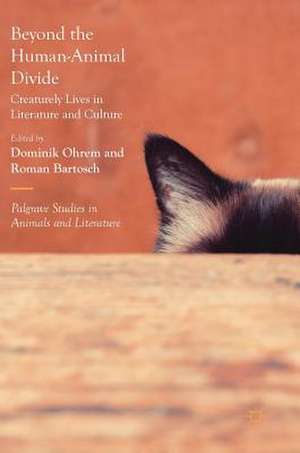Beyond the Human-Animal Divide: Creaturely Lives in Literature and Culture: Palgrave Studies in Animals and Literature
Editat de Dominik Ohrem, Roman Bartoschen Limba Engleză Hardback – 21 noi 2017
Din seria Palgrave Studies in Animals and Literature
- 18%
 Preț: 783.98 lei
Preț: 783.98 lei - 18%
 Preț: 893.21 lei
Preț: 893.21 lei - 18%
 Preț: 944.82 lei
Preț: 944.82 lei - 15%
 Preț: 696.02 lei
Preț: 696.02 lei - 18%
 Preț: 727.31 lei
Preț: 727.31 lei - 15%
 Preț: 589.51 lei
Preț: 589.51 lei - 18%
 Preț: 785.42 lei
Preț: 785.42 lei - 18%
 Preț: 785.11 lei
Preț: 785.11 lei - 18%
 Preț: 724.17 lei
Preț: 724.17 lei - 15%
 Preț: 699.28 lei
Preț: 699.28 lei - 18%
 Preț: 779.08 lei
Preț: 779.08 lei - 15%
 Preț: 585.08 lei
Preț: 585.08 lei - 15%
 Preț: 525.99 lei
Preț: 525.99 lei - 15%
 Preț: 585.90 lei
Preț: 585.90 lei - 18%
 Preț: 784.48 lei
Preț: 784.48 lei - 18%
 Preț: 783.05 lei
Preț: 783.05 lei - 15%
 Preț: 526.35 lei
Preț: 526.35 lei - 18%
 Preț: 891.02 lei
Preț: 891.02 lei - 18%
 Preț: 784.13 lei
Preț: 784.13 lei - 15%
 Preț: 699.77 lei
Preț: 699.77 lei -
 Preț: 383.50 lei
Preț: 383.50 lei - 15%
 Preț: 586.88 lei
Preț: 586.88 lei - 18%
 Preț: 892.59 lei
Preț: 892.59 lei - 18%
 Preț: 1131.56 lei
Preț: 1131.56 lei - 15%
 Preț: 588.18 lei
Preț: 588.18 lei - 15%
 Preț: 576.06 lei
Preț: 576.06 lei - 15%
 Preț: 585.57 lei
Preț: 585.57 lei - 15%
 Preț: 694.22 lei
Preț: 694.22 lei - 18%
 Preț: 785.11 lei
Preț: 785.11 lei - 18%
 Preț: 899.21 lei
Preț: 899.21 lei - 18%
 Preț: 732.07 lei
Preț: 732.07 lei - 18%
 Preț: 897.14 lei
Preț: 897.14 lei - 18%
 Preț: 894.46 lei
Preț: 894.46 lei -
 Preț: 384.86 lei
Preț: 384.86 lei
Preț: 786.18 lei
Preț vechi: 958.76 lei
-18% Nou
Puncte Express: 1179
Preț estimativ în valută:
150.46€ • 156.50$ • 124.21£
150.46€ • 156.50$ • 124.21£
Carte tipărită la comandă
Livrare economică 15-29 aprilie
Preluare comenzi: 021 569.72.76
Specificații
ISBN-13: 9781137603098
ISBN-10: 1137603097
Pagini: 325
Ilustrații: XV, 325 p. 6 illus.
Dimensiuni: 148 x 210 mm
Greutate: 0.56 kg
Ediția:1st ed. 2017
Editura: Palgrave Macmillan US
Colecția Palgrave Macmillan
Seria Palgrave Studies in Animals and Literature
Locul publicării:New York, United States
ISBN-10: 1137603097
Pagini: 325
Ilustrații: XV, 325 p. 6 illus.
Dimensiuni: 148 x 210 mm
Greutate: 0.56 kg
Ediția:1st ed. 2017
Editura: Palgrave Macmillan US
Colecția Palgrave Macmillan
Seria Palgrave Studies in Animals and Literature
Locul publicării:New York, United States
Cuprins
.- Animating Creaturely Life.- Earth Ethics and Creaturely Cohabitation.- An Address from Elsewhere: Vulnerability, Relationality, and Conceptions of Creaturely Embodiment.- “Creature Comforts”: Crafting a Common Language Across the Species Divide.- Cuts: The Rhythms of ‘Healing-with’ Companion Animals.- A Dog’s Death: Art as a Work of Mourning.- Playing Like a Loser.- Storying Creaturely Life.- The Collaborative Craft of Creaturely Writing.- Animals as Signifiers: Re-Reading Michel Foucault’s The Order of Things as a Genealogical Working Tool for the Historical Human-Animal Studies.- Reading Seeing: Literary Form, Affect, and the Creaturely Potential of Focalization.- Creaturely Apotheosis: Posthumanist Vulnerability in Hans Henny Jahnn’s Perrudja.- ‘the impulse towards silence’: Creaturely Expressivity in Beckett and Coetzee.- Fearful Symmetries: Pirandello’s Tiger and the Resistance to Metaphor.
Notă biografică
Dominik Ohrem is Lecturer in the Anglo-American Department of the School of History at the University of Cologne, Germany.
Roman Bartosch is Senior Lecturer in the Department of English at the University of Cologne, Germany.
Roman Bartosch is Senior Lecturer in the Department of English at the University of Cologne, Germany.
Textul de pe ultima copertă
This volume explores the potential of the concept of the creaturely for thinking and writing beyond the idea of a clear-cut human-animal divide, presenting innovative perspectives and narratives for an age which increasingly confronts us with the profound ecological, ethical and political challenges of a multispecies world. The text explores written work such as Samuel Beckett’s Worstward Ho and Michel Foucault's The Order of Things, video media such as the film "Creature Comforts" and the video game Into the Dead, and photography. With chapters written by an international group of philosophers, literary and cultural studies scholars, historians and others, the volume brings together established experts and forward-thinking early career scholars to provide an interdisciplinary engagement with ways of thinking and writing the creaturely to establish a postanthropocentric sense of human-animal relationality.
Caracteristici
Argues for the importance of the creaturely in navigating the ethical complexities of the Anthropocene Explores creatural presences across disciplines, including historiography, ethnography, philosophical argument, film, and visual arts Unites international perspectives from up-and-coming to established scholars
